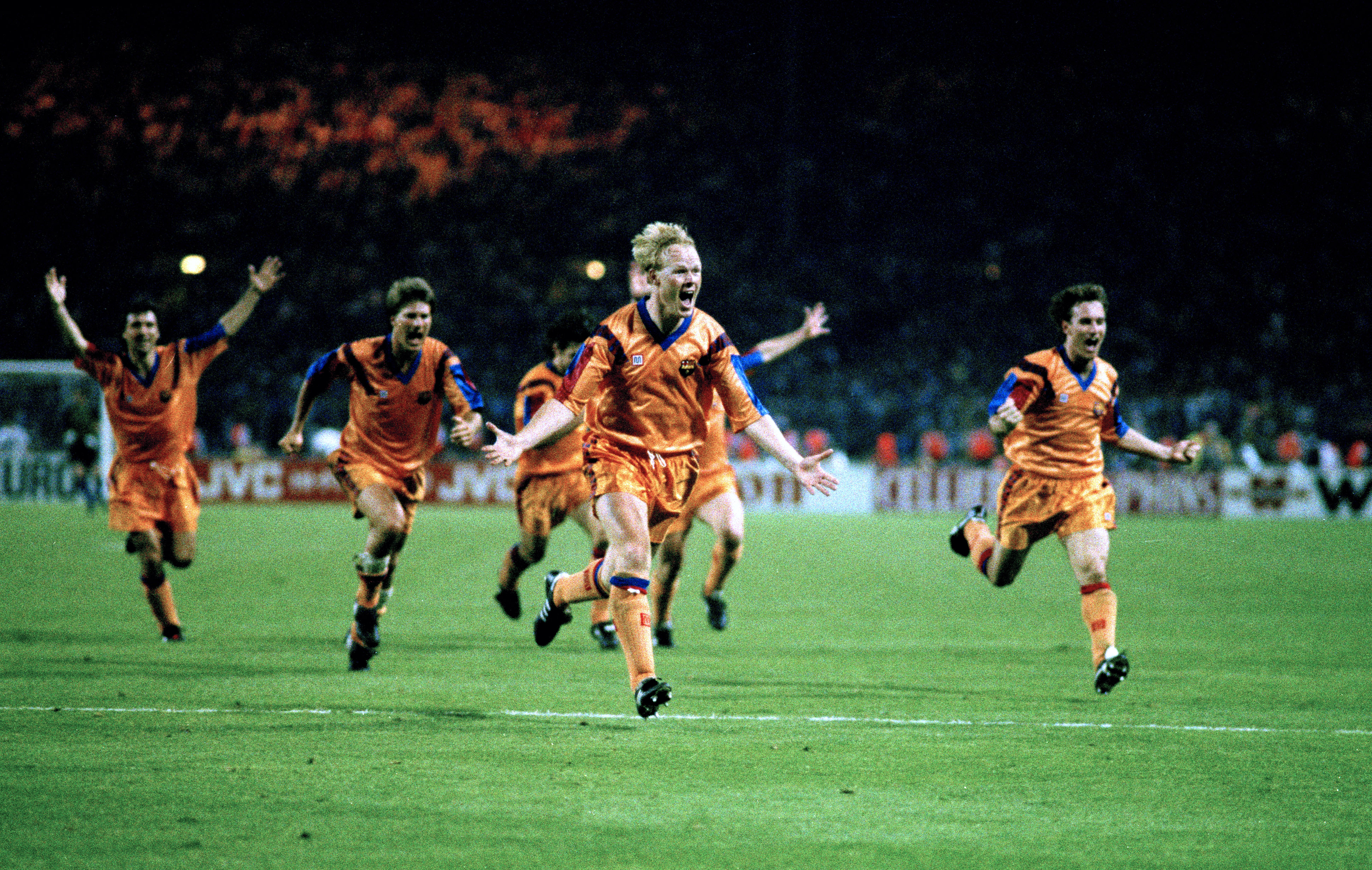Iniesta deserves so much more credit than he gets – and here’s why
The 31-year-old was ‘down’ at No.15 in the FFT100 – but John Robertson argues there are still so many reasons to consider him the world’s best central midfielder...
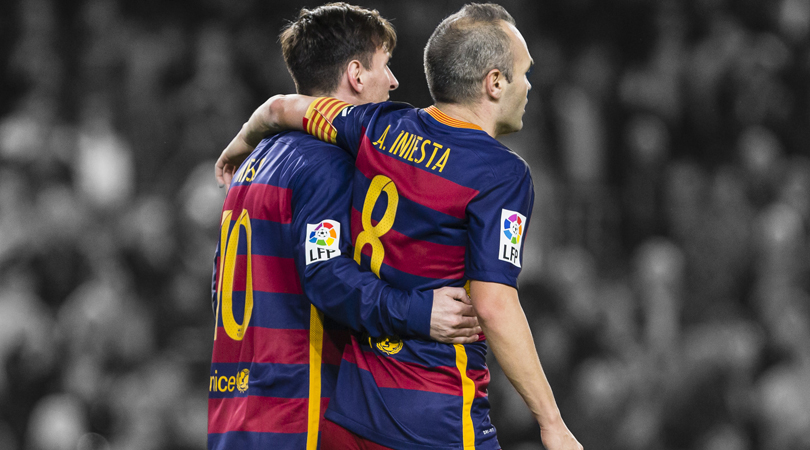
The impact that even the shortest amount of time can have on our perception of football is incredible. It can, within the course of a single season, turn the most unassuming of squad players into a global superstar. Just as effectively, it's capable of destroying the mystique surrounding the game's finest talents. From one season to the next, very few players can safely bet on retaining the status quo of their public image.
Such is the case with Andres Iniesta. Just a few years ago he was untouchable in the eyes of football fans and pundits alike, his combination with Xavi for both Spain and Barcelona ranked among the best partnerships in the sport’s history – perhaps even the greatest central-midfield pairing ever to grace a pitch.
Fewer still consider him a viable candidate for the Ballon d'Or or FIFPro Team of the Year – the likes of Ivan Rakitic, Toni Kroos and Paul Pogba are generally seen as superior options
Now, however, his star seems to be fading; the splitting up of the star duo having an overly exaggerated effect on how fans view him. Other than those dedicated to Barcelona, very few football followers mention Iniesta's name when discussing the best midfielders playing today. Fewer still consider him a viable candidate for the Ballon d'Or or FIFPro Team of the Year – the likes of Ivan Rakitic, Toni Kroos and Paul Pogba are generally seen as superior options now.
While age is undoubtedly catching up with him, to remove him from such discussions is, simply, absurd. His absence says a lot about the desire within much of the football community to crown the next big thing over appreciating, objectively, what is happening on the pitch today.
Remove that desire to create the next celebrity and it becomes clear that Iniesta should still be considered one of football's true elite, and perhaps even the world's finest midfielder.

Still a game changer
As with the 2010 World Cup Final, Iniesta proved that he is still the man to take the leadership role in high-pressure situations
If anyone needed a timely reminder of the fact that superior players can continue to perform past the age of 30, and at a level that the vast majority of professionals would never even dare dream of, you need look no further than Iniesta's performance against Real Madrid last month. To say he was the game's best player is an understatement. At times he made it look as though he was operating on a different level to everyone else; Neymar and Luis Suarez included.
The best features, fun and footballing quizzes, straight to your inbox every week.
With a successful pass percentage of 95.9% from 68 attempts, combined with a goal and an assist, Real Madrid proved incapable of muting his ability to control the pace and outcome of the game. As with the 2010 World Cup Final, Iniesta proved that he is still be the man to take the leadership role in high-pressure situations against the best opposition available.
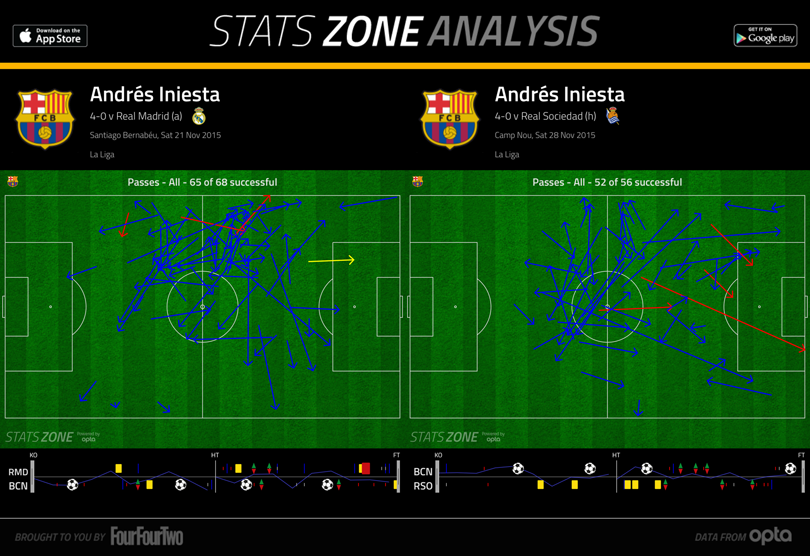
The story was similar in Barcelona's next La Liga match, versus Real Sociedad. Here he attempted fewer passes, but his pass-completion rate remained unbelievably high (92.9%) for a midfielder looking to play the ball forward across the entire width of the pitch.
Calls for Rakitic to become Barcelona's primary midfielder playmaker are justified over the medium-to-long term, but in the short-term the Croatian’s own performances lack the same degree of poise and authority – especially when it comes to distributing the ball to the forward trident of Neymar, Suarez and Lionel Messi.
EXCLUSIVE Ivan Rakitic: I didn't feel pressure replacing Xavi – I just enjoyed being around him
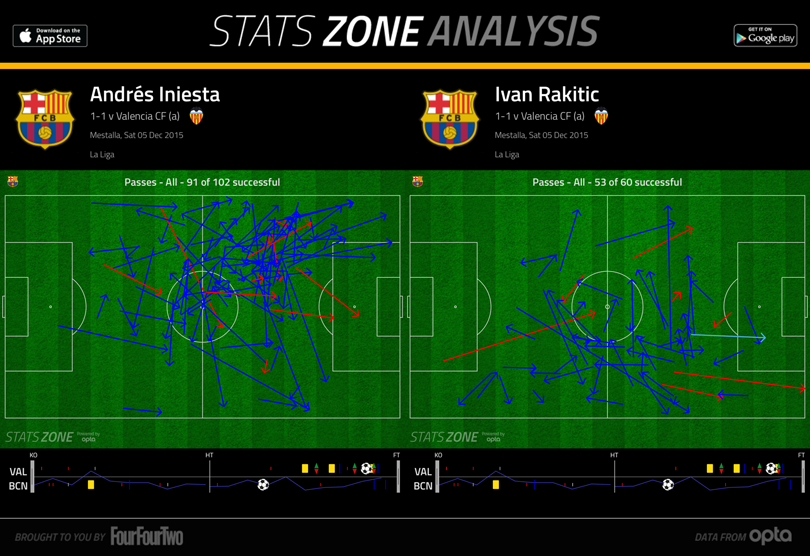
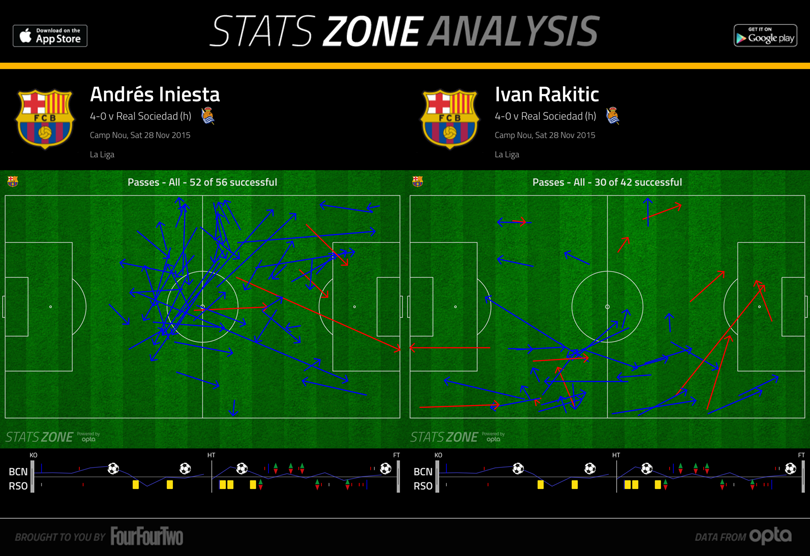
Adaptive intelligence
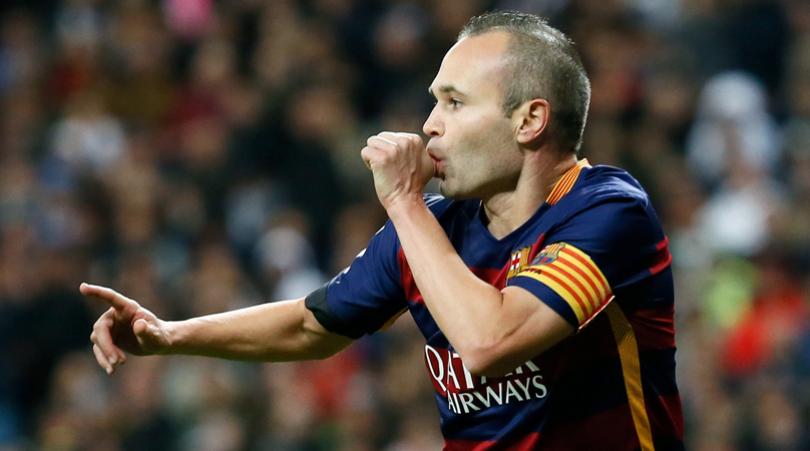
Having started his senior career with Barcelona B in 2001, Iniesta is, after 15 years as a professional, showing signs of fatigue – he sprints less, and picks up slight injuries more often. However, at 31 he makes up for his downturn in physical prowess by demonstrating ownership of a superior brain.
His intelligence, and the ability to diversify how those around him perform, is highlighted by how Barcelona's passing game is negatively affected when he's not in the team. In the eight La Liga games in which Iniesta has played more than 75 minutes this season, Barcelona have averaged 634.5 attempted passes. That's a lot of ball movement for the opposition to chase and keep track of. Without him, the number falls to 586.
A great indicator of his footballing intelligence exists in how he has altered the nature of his playing style in a way that mutes his downturn in physical ability, while making the most of his mind. Looking back just two years at the two fixtures highlighted above – away versus Real Madrid, home versus Real Sociedad – shows how his game has changed.
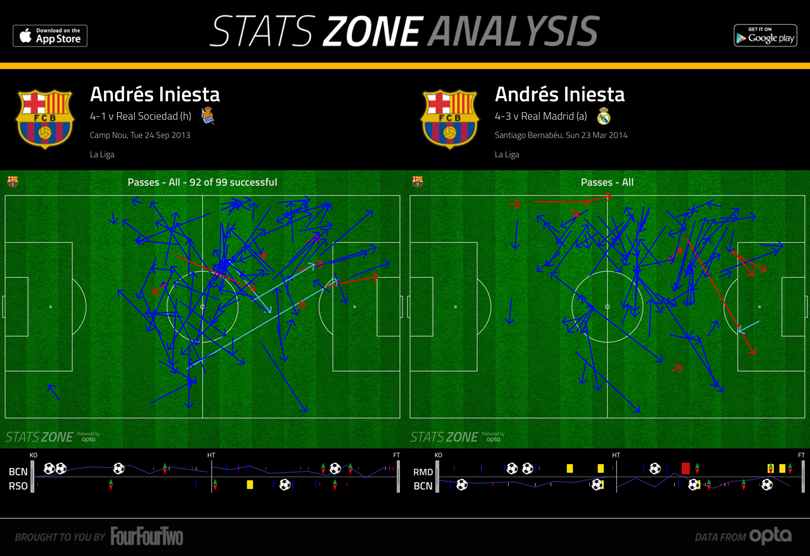
While he made fewer passes in the two respective fixtures this year than he did in the 2013/14 season, their nature this season is perfectly in keeping with the new style of play Barcelona opt for. With Suarez, Neymar and Messi looking to pick up the ball early and use their speed and dribbling to disrupt defenders, Iniesta concentrates much more on spreading the ball across the pitch – often increasing his passing distance well beyond what he used to attempt when inside the opposition's half in previous seasons.
It's often the case that when a team changes its culture on the pitch, those who were vital to implementing the previous style find themselves without a role due to their inability to adapt. Iniesta certainly doesn’t fit into that category of player.
More than a passer
When he picks his moments he remains more than able to beat his markers – a skill that he demonstrated frequently in November's Clasico
His age, though, has not reduced him to a one-dimensional entity. To say that he is 'merely' a passer would be false. Yes, he might not cover the kind of ground he did in 2010, but when he picks his moments he remains more than able to beat his markers – a skill that he demonstrated frequently in November's Clasico, much to Real Madrid's detriment (and not to mention last season in the Champions League against PSG, when he glided past three players before assisting Neymar for a finish).
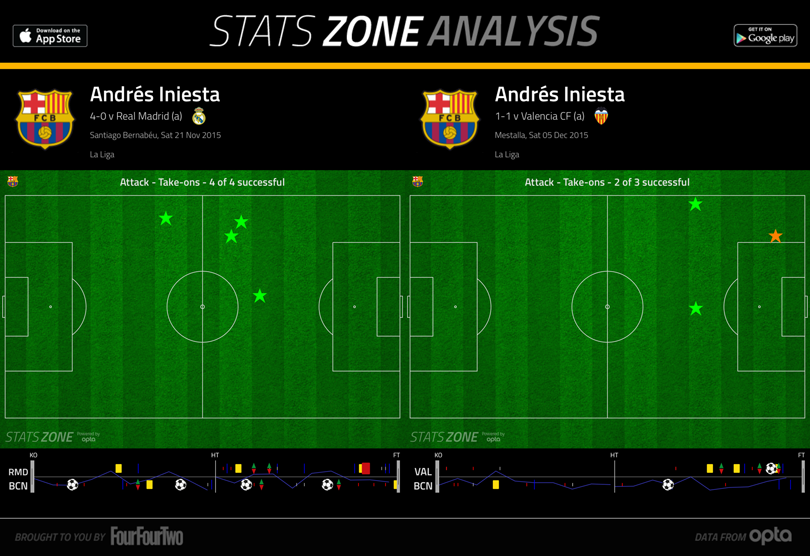
And then there's his defensive work, which is of that most underrated kind that only tends to reveal its importance in his absence. Iniesta sat out most of October through injury, a spell in which Barcelona conceded five goals in the three leagues games that they were without him.
In the nine La Liga games with him they’ve let in just six, with four of those coming in the surprise 4-1 defeat at the hands of Celta Vigo. Of the regular Barça starters, only Sergio Busquets, Javier Mascherano and Sergi Roberto average more tackles than Iniesta. Even then, Busquets, who enjoys most tackles, averages less than one more per game.
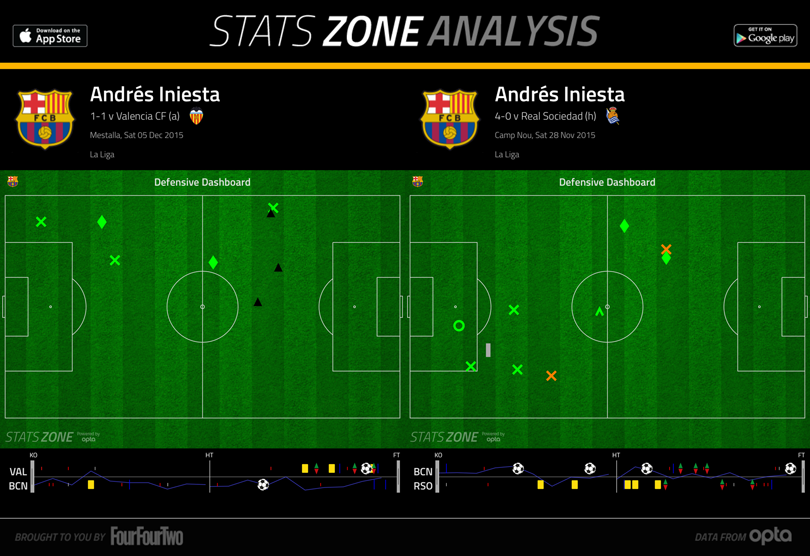
Despite his age, he remains a player whose impact is still felt whether he's on the ball or not. His ability to adapt his game, without abandoning those core gifts that initially propelled him to the top of the football tree, makes other players’ careers – including those younger than him – look miserable by comparison.
At this rate, the day we can legitimately start to ignore Iniesta as part of any 'world's best midfielder' debate is the one he retires on. Fingers crossed that that remains a long way off.
 Join The Club
Join The Club





